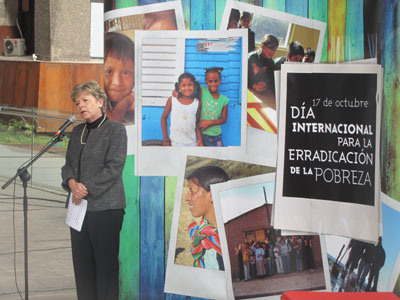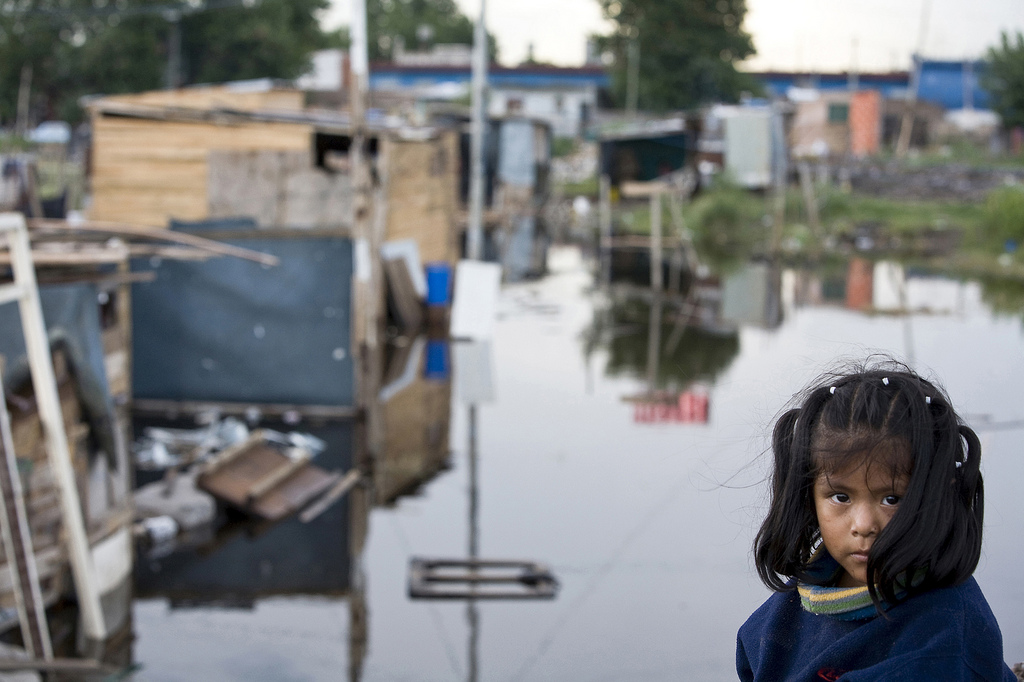Cooperation and Solidarity Between Countries Are Fundamental to Fighting Poverty
Work area(s)
The agreement between ECLAC, the National Foundation for Overcoming Poverty and American Solidarity will promote joint activities which help to close social gaps.

(17 October 2011) Today, the Economic Commission for Latin America and the Caribbean (ECLAC), the American Solidarity Foundation and the National Foundation for Overcoming Poverty signed a cooperation agreement to develop joint activities in the fight against poverty.
Technical cooperation, the development of knowledge, integration and solidarity between the countries of Latin America and the Caribbean are key to bridging social, territorial and economic gaps, and in turn help in the fight against poverty, stated the three institutions today, coinciding with the International Day for the Eradication of Poverty.
The agreement was signed in Santiago, Chile, by Alicia Bárcena, Executive Secretary of ECLAC, Benito Baranda, President of the American Solidarity Foundation, and Rodrigo Jordán, President of the National Foundation for Overcoming Poverty.
"Eradicating poverty and achieving equity are crucial for the exercise of citizenship and the respect of human dignity," stated Alicia Bárcena during the ceremony in the Gabriela Mistral Cultural Centre in the Chilean capital. "Now is the time for equality in the region, which requires a more active State role in well-being by a sustained increase in social expenditure, progress in social institutionality and income transfers with a clear redistribution effect," she added.
She reminded that by 2010, poverty affected 32.1% of the Latin American population, which represents a 11.9% drop since 2002, the year in which poverty and indigence reached the highest levels since 1990, thanks to sustained economic growth in the region between 2003 and 2008, and the increase in public transfers of resources to the poorest.
She said that this trend will continue in 2011. At the end of November, ECLAC will present its annual flagship publication Social Panorama of Latin America, in which it will give its updated projections on poverty in the region.
She warned that the outlook for 2012 is uncertain, given the instability of the international economic situation, which shows risks of economic contraction and a possible increase in poverty in the region. The increase in food prices and energy are added to this, which could affect the living conditions of the population.
"All of these elements highlight the importance of developing systematic efforts to eradicate poverty and achieve greater equality. Alliances and associations between State institutions, international cooperation agencies and civil society organizations should significantly help to bridge social gaps in the countries of the region," stated Bárcena.
In accordance with the agreement signed by the American Solidarity Foundation and the National Foundation for Overcoming Poverty, ECLAC will research, identify and measure poverty, provide advice on public policies and give professional training, among other cooperation activities.
Benito Baranda called to work "to create inclusive social policies, which help to overcome poverty and decrease inequality and exclusion, for and including people, families and communities which are currently in this situation."
Rodrigo Jordán stated that "the policies aimed at the worst forms of poverty must be coordinated with those which deal with the problems of new poverty and emerging middle classes."
"Everyone in the country and the continent, despite their place of birth or their "luck" should have similar levels of satisfaction, awareness and importance. This involves a better financial effort and changes in the understanding of and reaction to poverty," stated Jordán.
Any queries should be addressed to the ECLAC Public Information and Web Services Section. E-mail: dpisantiago@cepal.org; Telephone: (56 2) 210 2040.
Follow us on: Twitter, Facebook, Flickr and YouTube.
Related content

International Day for the Eradication of Poverty
Message by the Secretary-General of the United Nations, Ban Ki-moon.
Country(ies)
- Latin America and the Caribbean
Contact
Public Information Unit
- prensa@cepal.org
- (56 2) 2210 2040